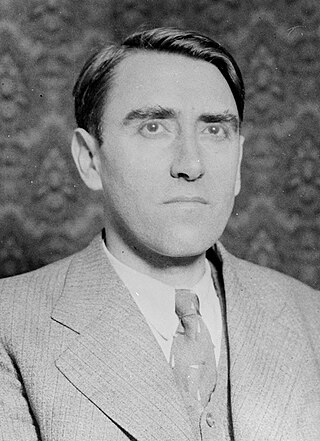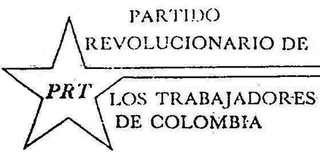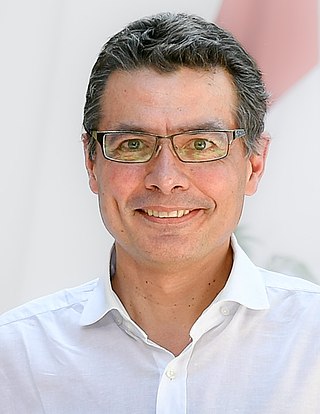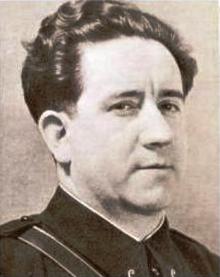
The Revolutionary Armed Forces of Colombia – People's Army is a Marxist–Leninist guerrilla group involved in the continuing Colombian conflict starting in 1964. The FARC-EP was officially founded in 1966 from peasant self-defense groups formed from 1948 during the "Violencia" as a peasant force promoting a political line of agrarianism and anti-imperialism. They are known to employ a variety of military tactics, in addition to more unconventional methods, including terrorism.

Andreu Nin i Pérez was a Spanish politician, trade unionist and translator. He is mainly known for his role in various Spanish left-wing movements of the early 20th century and, later, for his role in the Spanish Civil War. He is also known for his work translating Russian classics such as Ana Karenina, Crime and Punishment and some works by Anton Chekhov, from Russian into Catalan.
The Trotskyist Fraction – Fourth International (TF-FI) is a political international of Trotskyist political organizations that claim to adhere to the political legacy of the Fourth International.

Andrés Pastrana Arango is a Colombian politician who was the 30th President of Colombia from 1998 to 2002, following in the footsteps of his father, Misael Pastrana Borrero, who was president from 1970 to 1974.

The Colombian Conservative Party is a conservative political party in Colombia. The party was formally established in 1849 by Mariano Ospina Rodríguez and José Eusebio Caro.

Workers' Party of Spain–Communist Unity was a communist political party in Spain, founded by Santiago Carrillo and his followers after their expulsion from the Communist Party of Spain (PCE) in October 1985.

The Revolutionary Independent Labour Movement, or MOIR, is a left-wing party in Colombia that was founded in September 1969. Francisco Mosquera was the founder and ideological leader of MOIR. In August 1994 he died, after which Hector Valencia became the Secretary General of the party. In 2008 Valencia died and the union leader Gustavo Triana, vice president of the country's largest union, was elected Secretary General.
The history of Communism in Colombia goes back as far as the 1920s and has its roots in the ideas of the Russian October Revolution. Today guerrilla groups, self-proclaimed communists, state that they want to seize state power in Colombia by violent means, and organizations such as the National Liberation Army (ELN) continue their four decades old war with the United States-backed Colombian government.

El Espectador is a newspaper of national circulation within Colombia, founded by Fidel Cano Gutiérrez on March 22, 1887, in Medellín and published since 1915 in Bogotá. It transition from a daily to a weekly edition in 2001, following a financial crisis, and again with a daily released since May 11, 2008, a comeback which had been long rumoured, in tabloid format. From 1997 to 2011 its main shareholder was Julio Mario Santo Domingo.

Joaquín Maurín Juliá was a Spanish communist politician and activist. The leader of the Workers and Peasants Bloc (BOC) and of the Workers' Party of Marxist Unification (POUM), he was active mainly in Catalonia.

Luciano Marín Arango, better known as Iván Márquez, is a Colombian guerrilla leader, member of the Revolutionary Armed Forces of Colombia (FARC), part of its secretariat higher command and advisor to the Northwestern and Caribbean blocs. He was part of the FARC negotiators that concluded a peace agreement with President Juan Manuel Santos. On 29 August 2019, Márquez abandoned the peace process and announced a renewed armed conflict with the Colombian government.

Workers Revolutionary Party of Colombia was a political party in Colombia. The party was founded in 1982. It emerged from the 'Majority' faction of the Marxist-Leninist-Maoist Tendency, a group that had broken away from the Communist Party of Colombia (Marxist-Leninist) in the mid-1970s.

Rodrigo Londoño Echeverri, most known under the nom de guerreTimoleón Jiménez and the nickname Timochenko or Timochenco, is a Colombian politician, cardiologist and former commander-in-chief of the rebel group Revolutionary Armed Forces of Colombia, currently serving as the president of its political successor Commons following the Colombian peace process.

Alejandro Gaviria Uribe is a Colombian economist and engineer, serving as the Minister of National Education of Colombia since 7 August 2022, replacing María Victoria Angulo. He also served as Minister of Health and Social Protection of Colombia from 2012 to 2018. He is the former Rector of the University of Los Andes (Colombia), where he served from 2019 to August 2021. He was Dean of the School of Economics at University of los Andes in 2006, until his appointment as Minister in 2012. Prior to his academic career, Gaviria served as Deputy Director of the National Planning Department of Colombia, as well as Deputy Director of the Foundation for the Higher Education and Development (Fedesarrollo), a private non-profit policy research centre, and as a Researcher at the Inter-American Development Bank. A published author of several books and scientific articles in peer-reviewed journals, in 2019 he was appointed Rector of University of the Andes for a four-year period.

Antonio Mije García was a member of the Spanish Communist Party who became a deputy for Seville in the Second Spanish Republic. He served in various senior positions during the Spanish Civil War (1936–39). After the war he lived in France, Mexico and Czechoslovakia. He managed to retain his position as a party executive during the internecine struggles of the long years of exile.

Vicente Uribe Galdeano was a Spanish metalworker and politician who became a member of the executive of the Communist Party of Spain (PCE). He served as Minister of Agriculture during the Spanish Civil War (1936–1939) for the Republican faction. He went into exile in Mexico during World War II (1939–1945), then lived in France and Czechoslovakia after the war. He was disgraced in 1956 during the post-Stalinist power struggle.

María de los Ángeles Cano Márquez was a Colombian poet and writer who was the country's first female political leader. Called the "Flor del trabajo", Cano led the struggle for basic civil rights and the rights of salaried workers. She was the leader of several workers' strikes and a co-founder of the Socialist Revolutionary Party.

The Commons, previously Common Alternative Revolutionary Force until 24 January 2021, is a communist political party in Colombia, established in 2017 as the political successor of the former rebel group the Revolutionary Armed Forces of Colombia (FARC). The peace accords agreed upon by the Revolutionary Armed Forces of Colombia and the Colombian government in 2016 provided for the FARC's participation in politics as a legal, registered political party following its successful disarmament.

Francia Elena Márquez Mina is a Colombian human-rights and environmental activist and lawyer, who is the 13th and current Vice President of Colombia. She was born in Yolombó, a village in the Suarez municipality in Cauca Department. She first became an activist at 13, when construction of a dam threatened her community. On taking office, she became the first Afro-Colombian vice president in the country's history. She is also the second woman to hold the post, after Marta Lucía Ramírez. In August 2020, Márquez announced her candidacy in the 2022 Colombian presidential election and sought the nomination for the Historic Pact for Colombia coalition. She was later chosen by the coalition's nominee, Gustavo Petro, to be his running mate. In 2023 she was also appointed as Minister for Equality and Equity.
Events of 2019 in Colombia.


















